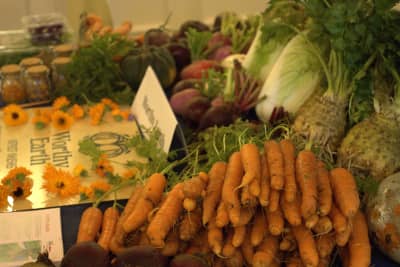On 21st September we came together in Oxford’s Town Hall for the Oxford CIty Food Action Working Group’s Food Summit, to discuss the draft Food Action Plans for the City and to invite consultation into the plans.
The Oxford City Food Action Working Group (FAWG) is comprised of representatives from local food and farming businesses, local authorities, local institutions, community groups and the Oxford Independent network, and has been meeting regularly since November 2022 to draft the Food Action Plan for Oxford City.
The Oxfordshire Food Strategy defined five priority areas which have helped guide the Local Food Action Plans. Using the Theory of Change approach, the FAWG are exploring actions and metrics to help meet the defined outcomes for each of the priority areas.
During the Food Summit, the attendees from across the food system in Oxford contributed to the draft plans, sharing many insights, ideas and solutions to some of the key issues.
We have summarised these below, highlighting some key contributions for each priority area. Before specific actions are committed to the plan, the FAWG will further examine the impact of actions and discuss the feasibility with stakeholders involved in the delivery of the actions:
Food poverty and diet-related ill health
· Central markets create incentives for traders to keep costs low and source locally
· More education on food growing to ease way out of food poverty. Increase access to food via more growing sites in target areas
· Promote food education and nutrition - need access to resources to support growing, healthy cooking and sourcing
· More resources on cooking with vegetables, including cooking with surplus and unknown veggies, and cooking with leftovers
· Promote and support Universal Free School Meals, and support schools to provide cooking and growing education in schools
Vibrant food communities
· Connect kitchen spaces with community groups and cooking facilitators, to encourage community cooking opportunities and to enhance participation in cooking and eating healthy and sustainable food together
· Support more community food growing spaces, with training and support to encourage skills in growing. There is a skills gap in food production!
· Promote pathways into food production as a viable living with economic incentives and established routes to market – for example enabling trading opportunities for small local growers
· Promote after-school gardening lessons and space put aside for growing. Link schools to community groups, campaigns and projects to get kids involved in growing and cooking
· Promote best practice, case studies and models of how to grow edible plants on public land such as highways, verges and in public planters
Grow the local food economy
· Ensure empty commercial units are accessible for food enterprise with lower rent prices
· Contract kitchen space for more community cooking, processing space - get farmers to consider unused spaces Set up local ‘temp’ staff agency for smaller, purposeful businesses (to help solve staffing issue)
· Research to understand potential yields and growing space within city. Explore Growing Communities ‘food zones’ model to plan land use in city
· Support and training on how to set up a local food enterprise
Short transparent supply chains
· Maximise more land for food growing, ensuring unused council and college land is converted into spaces for food production and community participation in growing.
· Encourage more food production via a national service scheme in food production!
· Food needs equal validity and priority in Land Use Strategies, we need to lobby the Food, Farming and Countryside Commission to ensure that food production is included in plans
· Facilitate connections between local producers with retailers and consumers.
· Promote and educate consumers on the benefits of eating local and seasonable produce, on the economic benefits of supporting local producers, and pricing and the true cost of food.
· Ensure a Living Wage for market gardeners and growers to ensure that growing is recognised as a viable career. Invest in local CSA and get locally grown food into schools and institutions.
· Put pressure on supermarkets, local convenience stores and retailers to stock and promote local producers
Institutional catering
· Templates required for procurement charter to support institutions on local procurement guidelines and policies, with measurable targets over a defined time period
· Institutions should have a broader responsibility to align their food procurement and catering with sustainability purpose/ targets and grow or produce more food on sites
· Schools with unused kitchens could become community cooking hubs, for example out of hours on in school holidays
· Need to showcase case studies of examples where institutions have sustainable procurement practices, for example schools, colleges or universities with growing sites, or where catering teams are using local produce
Over the next few months we will be running further consultations on the Local Food Action plans and consolidating any feedback, with the finalised Food Action Plans ready to launch in early 2024.
If you would like to feed into the draft Food Action Plans or be keep in the loop as to the Food Action Working Groups please contact jess@gfo.org.uk.



